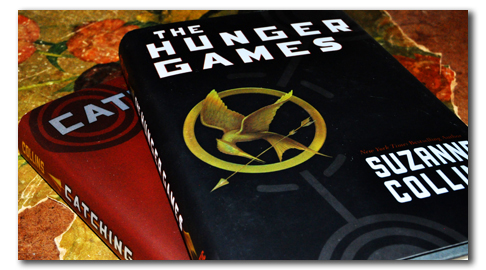Lesson Two - Social Movements and Social Change
2.3 Social Change
Making Connections: Real World
Our Dystopian Future: From A Brave New World to The Hunger Games

Figure 21.11. Is the glass half empty or half full when it comes to social change? Fiction writers explore both sides of the issue through fantasy futuristic novels like The Hunger Games trilogy by Suzanne Collins. (Photo courtesy of Carissa Rogers/flickr)
Humans have long been interested in science fiction and space travel, and many of us are eager to see the invention of jet packs and flying cars. But part of this futuristic fiction trend is much darker and less optimistic. In 1932, when Aldous Huxley’s Brave New World was published, there was a cultural trend toward seeing the future as golden and full of opportunity. In his novel set in 2540, there is a more frightening future. Since then, there has been an ongoing stream of dystopian novels, or books set in the future after some kind of apocalypse has occurred and when a totalitarian and restrictive government has taken over. These books have been gaining in popularity recently, especially among young adult readers. And while the adult versions of these books often have a grim or dismal ending, the youth-geared versions usually end with some promise of hope.
So what is it about our modern times that makes looking forward so fearsome? Take the example of author Suzanne Collins’s hugely popular Hunger Games trilogy for young adults. The futuristic setting isn’t given a date, and the locale is Panem, a transformed version of North America with 12 districts ruled by a cruel and dictatorial capitol. The capitol punishes the districts for their long-ago attempt at rebellion by forcing an annual Hunger Game, where two children from each district are thrown into a created world where they must fight to the death. Connotations of gladiator games and video games come together in this world, where the government can kill people for their amusement, and the technological wonders never cease. From meals that appear at the touch of a button to mutated government-built creatures that track and kill, the future world of Hunger Games is a mix of modernization fantasy and nightmare.
When thinking about modernization theory and how it is viewed today by both functionalists and conflict theorists, it is interesting to look at this world of fiction that is so popular. When you think of the future, do you view it as a wonderful place, full of opportunity? Or as a horrifying dictatorship sublimating the individual to the good of the state? Do you view modernization as something to look forward to or something to avoid? And which media has influenced your view?